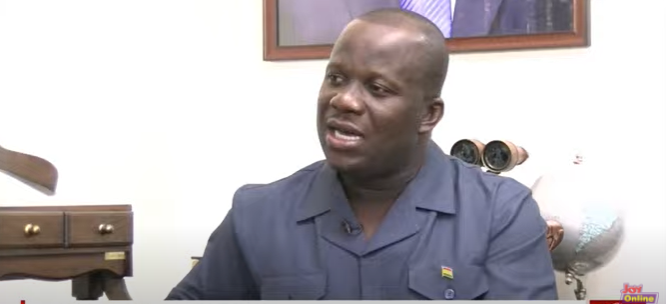Lands and Natural Resources Minister, Samuel Abu Jinapor, says government is fully aware of the complexities involved in the war against illegal small-scale mining and is committed sanitising the sector as long as it takes.
The minister has also acknowledged the “recalcitrant nature of the cartels involved" in the illegal mining enterprise who have largely contributed to, and responsible for how the fight against the menace has dragged for years.

The small-scale mining sector is responsible for about a third of Ghana’s gold export. The sector, in 2019, exported about 1.6 million ounces of gold to the international gold market.
Addressing participants at a 3-day workshop in Accra Monday, the lands minister who is also MP for Damango in the Savannah region said, the administration has invested heavily in the small-scale mining industry alongside stringent and more punitive legal regime intended to sanitize the sector.
"Lately, we have had to adopt more stringent measures, including the declaration of river bodies as red zones for mining, the ban on reconnaissance, prospecting and/or exploration in Forest Reserves, the launch of Operation Halt II to rid river bodies and forest reserves of illegal mining activities, the introduction of speed boats and river guards to patrol and protect our river bodies, ban on the manufacture, sale and/or use of the floating platform, popularly referred to as Changfan, which are used in the pollution of water bodies, and the enhancement of the punishment regime for persons involved in illegal mining."

However, he acknowledged the difficulties involved in the government’s clampdown against illegal small-scale mining that has dragged on for years now.
"We recognize the complexities involved in this fight, and the recalcitrant nature of the cartels involved, largely because of the huge sums of money involved in this enterprise. But we are committed to working with all stakeholders to ensure that we build a responsible, sustainable and environmentally-sound small scale mining industry’’.
Meanwhile, Senior Adviser of the World Gold Council Edward Becham underscored the need for mining companies to leave behind positive legacies in host communities.
"We want to chart a course that is about building a wider coalition of interest particularly with government with institutions like the World Bank with supply chain actors in society and indeed with Artisanal small-scale miners themselves in trying to build an artisanal small-scale mining framework. We want, when we finish mining in an area, to leave behind a good legacy, legacy of communities that have learned better and new ways of growing’’.
The workshop which has attracted industry players from about nine African countries is expected to end on Wednesday.
Latest Stories
-
Police arrest suspect in Gomoa Buduatta Junction robbery
13 minutes -
President’s Cup 2025: Kotoko claim victory over Hearts after coming from a goal down
33 minutes -
Ahanta West MP, Mavis Kuukua Bissue, brings Ahanta language to the classroom
52 minutes -
Hamas security officer says group has lost control over most of Gaza
2 hours -
TEWU-TUC denounces splinter union’s strike as ‘unlawful and destructive’
2 hours -
Rising phenomenon of academic title ‘fraud’; vice chancellors back GTEC to purge system of all ‘unearned’ titles in PhD
4 hours -
Kudus keen on Tottenham move despite first bid rejected
4 hours -
How our lack of enlightenment costs us more than corruption
4 hours -
Hearts of Oak and Asante Kotoko renew rivalry in President’s Cup clash
5 hours -
WAFCON 2024: Morocco and Zambia draw opening match
5 hours -
Texas flood victims: Girl ‘having time of her life’ and ‘heart and soul’ of camp
5 hours -
Archaeologists unveil 3,500-year-old city in Peru
5 hours -
British Columbia College advocates AI at its 9th graduation ceremony
5 hours -
Two administrations, same pattern of betrayal: LI 2462 and the legacy of Ghana’s forests
5 hours -
“Making Ghana the True Black Star of the World” book launched in Bibiani
5 hours

